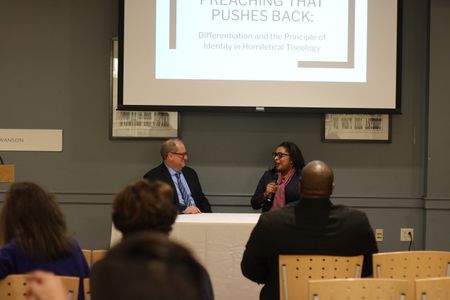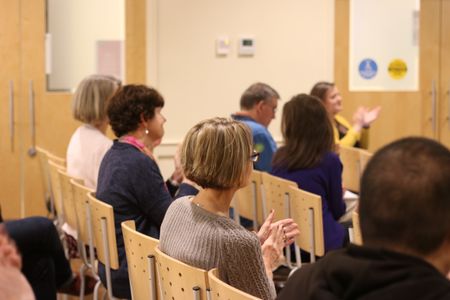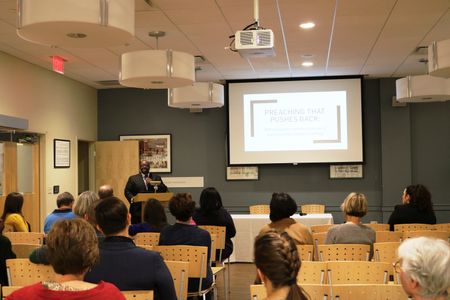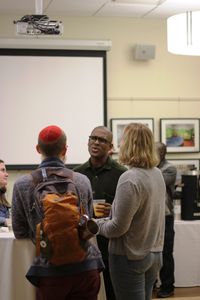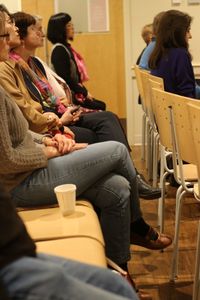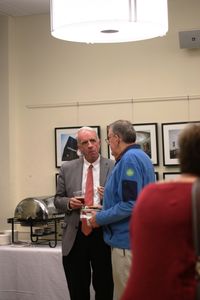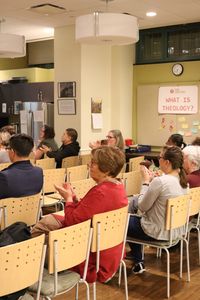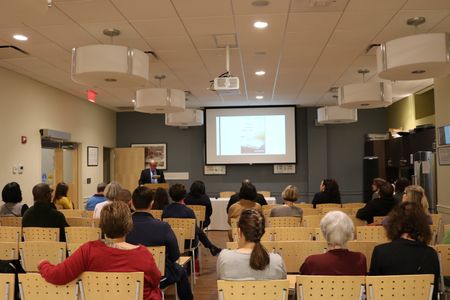The Center for Practical Theology’s Twelfth Annual Lecture with Dr. David Jacobsen

We were thrilled to welcome Boston University School of Theology’s own Dr. David Schnasa Jacobsen to give the Center for Practical Theology’s Twelfth Annual Lecture on October 23, 2019. Dr. Jacobsen presented “Preaching that Pushing Back: Differentiation and the Principle of Identity in Homiletical Theology,” and Boston University School of Theology’s Assistant Professor of New Testament Dr. Shively Smith responded to the lecture.
We were pleased to welcome our colleagues from BU School of Theology, Boston Theological Institute schools, and from the greater Boston community. A YouTube video of the lecture is available here. We are so grateful to Dr. Jacobsen for sharing his insights with us.
Below, PhD Student in Practical Theology, Amy McLaughlin- Sheasby, responds to Dr. Jacobsen’s lecture.
by Amy McLaughlin-Sheasby
 On the evening of October 23, 2019, students and faculty gathered together for the CPT’s 12th annual lecture, given this year by the School of Theology’s own Dr. David Schnasa Jacobsen. Dr. Jacobsen is the professor of the Practice of Homiletics, and was recently installed as the Bishops Scholar of Homiletics and Preaching earlier this month. In his lecture titled “Preaching That Pushes Back: Differentiation and the Principle of Identity in Homiletical Theology” Dr. Jacobsen invited us to consider how social difference and identity negotiation require a reconsideration of the tasks of interpretation and preaching. He proposed that faithful tending to social difference sometimes requires the preacher to preach against the text. To preach against a text is not to forsake the importance of careful study and exegesis, nor to abandon reverence for scripture, but rather to seek greater awareness of how social difference may impact the reception of scripture. Videos of sermons from Barbara Brown Taylor and Lisa Thompson helped to demonstrate how a preacher might push back against a difficult text in order to proclaim a truly liberating, gospel word.
On the evening of October 23, 2019, students and faculty gathered together for the CPT’s 12th annual lecture, given this year by the School of Theology’s own Dr. David Schnasa Jacobsen. Dr. Jacobsen is the professor of the Practice of Homiletics, and was recently installed as the Bishops Scholar of Homiletics and Preaching earlier this month. In his lecture titled “Preaching That Pushes Back: Differentiation and the Principle of Identity in Homiletical Theology” Dr. Jacobsen invited us to consider how social difference and identity negotiation require a reconsideration of the tasks of interpretation and preaching. He proposed that faithful tending to social difference sometimes requires the preacher to preach against the text. To preach against a text is not to forsake the importance of careful study and exegesis, nor to abandon reverence for scripture, but rather to seek greater awareness of how social difference may impact the reception of scripture. Videos of sermons from Barbara Brown Taylor and Lisa Thompson helped to demonstrate how a preacher might push back against a difficult text in order to proclaim a truly liberating, gospel word.
The thesis of this lecture was eagerly anticipated by students and faculty who share a vested interest in conversations around identity, power, and theology. Following the lecture, Dr. Jacobsen was joined by New Testament professor, Dr. Shively Smith, to discuss various interpretive approaches to biblical texts. Questions and comments from Hebrew Bible professor Dr. Katheryn Darr, as well as New Testament professor Dr. Luis Menéndez-Antuña, helped to round out an important interdisciplinary conversation on biblical interpretation.
Ultimately, this year’s lecture provided a platform from which Dr. Jacobsen could highlight the great promise of homiletical theology for the field of practical theology. Few other practical theological areas are so deeply concerned with examining the relationship between communities of faith and their scriptures. While many practical theologians must contend with questions concerning theological norms and sources of authority, homiletics offers a distinct avenue for these conversations. Homileticians presuppose the community’s engagement with sources of authority—such as scripture—and thus seek to shape the process of interpretation and proclamation. Dr. Jacobsen’s lecture reminded us that a homiletical theology which carefully tends to issues of power and identity may also clear paths for liberative theologies in communities of faith. Preaching that pushes back offers a plenitude of paths forward for communities of difference that are bound together by a shared faith.
Amy McLaughlin-Sheasby is a PhD Student in Practical Theology with a Concentration in Homiletics at the Boston University School of Theology. Her research interests include trauma-informed homiletical theology, trauma theory, homiletical pedagogy, feminist hermeneutics, wisdom literature and wisdom traditions, and preaching and the Hebrew Bible. Dr. David Schnasa Jacobsen is her advisor.
